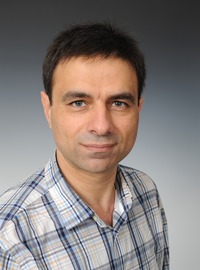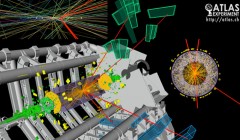Christos Leonidopoulos

Professor C Leonidopoulos
- Position
- Personal Chair of Experimental Particle Physics
- Category
- Academic staff
- Location
-
James Clerk Maxwell Building (JCMB)
Room 3408
- Email: Christos.Leonidopoulos [at] ed.ac.uk
- Tel: +44 (0)131 650 6769
- Personal home page
- Edinburgh Research Explorer profile
Christos is a member of the following School research institute, research group and research areas:
Research institute
Research group
Research areas
Research interests
Christos Leonidopoulos is a Professor with a Personal Chair in Experimental Particle Physics at the University of Edinburgh.
He received his PhD from Princeton University in 2000, working on Bd mixing and CPT violation searches with the Belle experiment at KEK, Japan. In his thesis he carried out the first experimental test of CPT symmetry in the Bd system and produced the most precise mixing measurement in the world at the time [Int. J. Mod. Phys. A16S1A, 401-403 (2001) and Phys.Rev.Lett. 86 (2001) 3228, a paper with 155 citations]
He then worked on Bd and Bs mixing with the D0 experiment at Fermilab, Chicago as a Research Associate with Columbia University. He served as the B Mixing & Lifetimes Physics Group Convener [Phys.Rev.Lett.97:241801 (2006), a paper with 51 citations, and Phys.Rev.Lett. 97 (2006) 021802, a paper with 378 citations]. In parallel, he led the integration and commissioning of the Level-2 muon trigger [Nucl.Instrum.Meth. A565 (2006) 463-537].
He moved to Geneva, Switzerland in 2004 as Research Physics Staff with CERN where he worked on building the CMS experiment, and in particular on the design, implementation and commissioning of a novel triggering system known as the High Level Trigger [CERN/LHCC 2007-021, LHCC-G-134 (2007), J.Phys.G34:995-1579 (2007), JINST 0803:S08004 (2008) and JINST 5:T03005 (2010)]. He served as the Deputy Trigger Coordinator for the startup of the LHC and for four years.
In 2011 he received a Senior LPC Fellowship by Fermilab during which he implemented with his team a programme of generic searches for new heavy charged bosons, producing the most stringent exclusion limits in the world in several final states [Phys. Lett. B701, 160–179 (2011): a paper with 59 citations, JHEP 08 (2012) 023: a paper with 101 citations, Phys. Rev. Lett. 109, 141801 (2012): a paper with 48 citations, and JHEP 02 (2013) 036: a paper with 45 citations]. His involvement with CMS culminated with the discovery of the Higgs boson [Phys.Lett. B716 (2012) 30-61, a paper with 11,000+ citations].
He moved to Edinburgh in 2012 and joined the ATLAS experiment. He worked on the measurement of the Higgs boson properties [Phys. Rev. D 91, 012006 (2015): a paper with 312 citations; Phys. Rev. D. 90, 052004 (2014): a paper with 503 citations, and Eur. Phys. J. C (2015) 75:335: a paper with 141 citations].
With the beginning of Run-2, he launched a new programme of searches for exotic particles, and in particular for diboson resonances, Dark Matter mediators, and right-handed W bosons and heavy neutrinos [JHEP 09(2016)173: a paper with 105 citations, Phys. Lett. B 777 (2017) 91: a paper with 69 citations, JHEP 03 (2018) 009: a paper with 76 citations, JHEP 04(2016)155: a paper with 22 citations, Phys. Lett. B 788 (2019) 316: a paper with 72 citations, and JHEP 01(2019) 016: a paper with 31 citations].
He served as the Trigger Menu coordinator for the ATLAS experiment for two years (2016-8). He currently serves as the Online software and computing (WG10) Convener for the FCC-ee/TLEP concept study [JHEP01(2014)164: a paper with 451 citations, Eur. Phys. J. Spec. Top. (2019) 228: 261: a paper with 51 citations].
He designed (and has been running every year since 2014) a MOOC on the discovery of the Higgs boson, a course with thousands online participants.
His general research interests lie in the Electroweak Symmetry-Breaking mechanism, in Exotic physics searches at the LHC, and in triggers. In the next years, together with his research team, he will be focussing on searches for new exotic particles, upgrades of the High-Level Trigger for the ATLAS experiment at the LHC, and the design of future colliders.
Websites
Additional information can be found at his personal page.
Higgs Massive Open Online Course (MOOC)
- Overall coordination and design of the course (with Prof. Luigi Del Debbio)
- Development of lecture discussing the experimental aspects of the discovery of the Higgs boson.
Run dates:
- Every year since 2014
- Next launch date: February 2021
https://www.futurelearn.com/courses/higgs
Data Analysis and Machine Learning (PGPH11105)
- Post-graduate course covering core skills related to data analysis and statistical interpretation: maximum likelihood fits, systematic effects, hypothesis testing, advanced techniques such as multivariate methods and machine learning, and simulation of experimental data.
- Data analysis techniques are applied to data collected by current experiments.
- 2018-today
Collider Physics
- Post-graduate course with the Scottish Universities Physics Alliance (Spring); Emphasis given on recent experimental resuls & papers
- 2013 - 2019
Relativity, Nuclear and Particle Physics (PHYS10096)
- "Particle Physics" module: 2014-18, 2020
- "Relativity" module: 2019
Christos currently offers the following PhD project opportunities:
Christos has featured in the following recent School news stories:

Exotic Particles Discoveries at Colliders
In this video Christos describes his research with the ATLAS experiment: The discovery of the Higgs boson, the search for new Exotic Particles and the quest to understand what the Universe is made of.Recent publications
- , European Physical Journal - Special Topics, 85, p. 1-218
- Future Circular Collider Feasibility Study Report Volume 2, Accelerators, Technical Infrastructure and Safety DOI, European Physical Journal - Special Topics, 234, p. 5713-6197
- A measurement of the high-mass τ ¯τ production cross-section at √s = 13 TeV with the ATLAS detector and constraints on new particles and couplings DOI, Journal of High Energy Physics, 2025, p. 1-51
- A search for dark matter produced in association with a dark Higgs boson decaying into a Higgs boson pair in 3b or 4b final states using pp collisions at √s = 13 TeV with the ATLAS detector DOI, Journal of High Energy Physics, 2025, 09, p. 1-48

